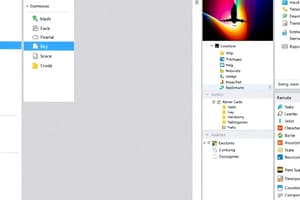Podcast
Questions and Answers
Which of the following best describes the delegation event model in event handling?
Which of the following best describes the delegation event model in event handling?
- A framework that uses a central event manager to handle all events.
- A mechanism consisting of an event source, event object, and event listener. (correct)
- A model where events are ignored unless a specific handler is registered globally.
- A system where events are directly processed by the component that generates them.
In Java AWT and Swing, what is the primary role of a 'listener'?
In Java AWT and Swing, what is the primary role of a 'listener'?
- To encapsulate data about specific events.
- To generate events based on user actions.
- To define methods that are invoked when specific types of events occur. (correct)
- To manage the graphical user interface components.
Which listener interface would you typically use to handle mouse click events in a Java Swing application?
Which listener interface would you typically use to handle mouse click events in a Java Swing application?
- MouseListener (correct)
- ItemListener
- KeyListener
- ActionListener
You have a JButton in your Java Swing application. Which method should you use to attach an ActionListener to this button?
You have a JButton in your Java Swing application. Which method should you use to attach an ActionListener to this button?
In the context of Java AWT and Swing event handling, what does an EventObject primarily encapsulate?
In the context of Java AWT and Swing event handling, what does an EventObject primarily encapsulate?
Which of the following is NOT a commonly used listener interface in Java AWT and Swing?
Which of the following is NOT a commonly used listener interface in Java AWT and Swing?
What is the benefit of using lambda expressions when creating listeners in Java (from Java 8 onwards)?
What is the benefit of using lambda expressions when creating listeners in Java (from Java 8 onwards)?
What is the key difference between implementing listeners as inner classes versus outer classes?
What is the key difference between implementing listeners as inner classes versus outer classes?
Which best practice helps improve the responsiveness of Java Swing applications?
Which best practice helps improve the responsiveness of Java Swing applications?
Why is it important to detach listeners that are no longer needed in a Java GUI application?
Why is it important to detach listeners that are no longer needed in a Java GUI application?
Flashcards
Event Handling
Event Handling
Manages interaction between user and application, triggered by GUI components.
Delegation Event Model
Delegation Event Model
The architectural pattern for event handling, consisting of event source, object, and listener.
Event Source
Event Source
The component that generates the event (e.g., a button).
Event Object
Event Object
Signup and view all the flashcards
Event Listener
Event Listener
Signup and view all the flashcards
Listeners
Listeners
Signup and view all the flashcards
ActionListener
ActionListener
Signup and view all the flashcards
MouseListener
MouseListener
Signup and view all the flashcards
KeyListener
KeyListener
Signup and view all the flashcards
Attaching a Listener
Attaching a Listener
Signup and view all the flashcards
Study Notes
- Event handling manages the interaction between the user and the application.
- Events are generated when users interact with GUI components like buttons, text fields, and checkboxes.
- The event handling mechanism follows the delegation event model.
- The delegation event model consists of three main components: Event Source, Event Object, and Event Listener.
Event Handling Components
- Event Source: The component (e.g., a button) that generates the event.
- Event Object: Encapsulates information about the event (e.g., ActionEvent).
- Event Listener: The object that receives and processes the event.
Understanding Listeners and Events
- Listeners are the interfaces that define methods to handle specific types of events.
- When an event occurs, the corresponding method of the listeners is invoked.
- Events are instances of classes that extend the EventObject class, such as ActionEvent, MouseEvent, or KeyEvent.
Commonly Used Listener Interfaces
- ActionListener: Handles action events (e.g., button clicks).
- MouseListener: Handles mouse events (e.g., click, press, release).
- KeyListener: Handles keyboard events (e.g., key press, key release).
- ItemListener: Handles item selection events (e.g., checkbox selection).
- WindowListener: Handles window events (e.g., window closing, opening).
How to Attach a Listener
- Every listener is attached to a GUI component using methods like addActionListener(), addMouseListener(), etc.
- When an event occurs, the listener's method is called.
Key points of Example 1
- The button is the event source.
- The ActionEvent contains information about the click.
- The ActionListener processes the event.
Advanced Techniques
- From Java 8 onward, users can simplify listeners using lambda expressions.
Inner vs Outer Classes
- Inner Classes: Listeners are implemented directly inside the class.
- Outer Classes: Users can create separate classes for each listener, making the code more modular.
Best Practices
- Use Layout Managers: Avoid using null layouts for better responsiveness.
- Detach Listeners: Remove unused listeners to free up resources.
- Test Event Flow: Debug to ensure events are being handled correctly.
Studying That Suits You
Use AI to generate personalized quizzes and flashcards to suit your learning preferences.




